 W
WAgainst the Storm is a radio daytime drama which had three separate runs over a 13-year period; the initial run was on the NBC Red Network from October 16, 1939, to December 25, 1942, with revivals of the series on Mutual from April 25 to October 21, 1949, and ABC from October 1, 1951, to June 27, 1952. Created and written by Sandra Michael, the drama was the only daytime radio serial to ever win a Peabody Award, for "Outstanding Entertainment in Drama" in 1941.
 W
WAunt Jenny's Real Life Stories is a 15-minute radio drama that aired January 18, 1937, to November 16, 1956, on CBS, sponsored by Spry shortening. The program was heard weekdays at 11:45 a.m. until 1946, when it moved to 12:15 p.m.
 W
WBachelor's Children is a domestic daytime drama broadcast that originated on Chicago's WGN in 1935–36, continuing on CBS and NBC until September 27, 1946.
 W
WBackstage Wife is an American soap opera radio program that details the travails of Mary Noble, a girl from a small town in Iowa who came to New York seeking her future.
 W
WBig Sister was a daytime radio drama series created by Lillian Lauferty and broadcast on CBS from September 14, 1936, to December 26, 1952. It was sponsored by Lever Brothers for Rinso until 1946 when Procter & Gamble became the sponsor.
 W
WBodyLove is a radio soap opera in which the characters face common health problems and attempt to deal with them using practical solutions and healthier eating. Billed as "the soap opera that's good for you", BodyLove uses fictional drama to reach African American listeners with messages that promote healthy lifestyles. The program is based upon the principles of "entertainment-education" that have been recommended for reaching audiences not reached by traditional health education and health promotion messages.
 W
WBrenda Curtis is an old-time radio soap opera in the United States. It was broadcast on CBS September 11, 1939 - January 19, 1940.
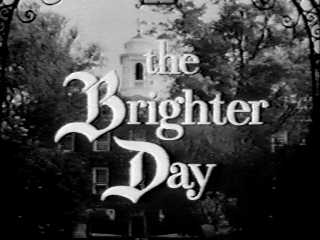 W
WThe Brighter Day is an American daytime soap opera which aired on CBS from January 4, 1954, to September 28, 1962. Originally created for NBC Radio by Irna Phillips in 1948, the radio and television versions ran simultaneously from 1954–1956. Set in New Hope, Wisconsin, the series revolved around Reverend Richard Dennis and his four children, Althea, Patsy, Babby and Grayling.
 W
WClara, Lu, 'n Em is a radio soap opera, which first aired on June 16, 1930, over WGN-AM Chicago, Illinois. The show was picked up by the NBC Blue radio network and premiered at 10:30 p.m. Eastern Time on January 27, 1931. Thus, it became the first nationally broadcast radio soap opera. When Clara, Lu 'n Em was moved to a regular daytime time slot on February 15, 1932, it became the first networked daytime soap opera.
 W
WDan Harding's Wife was a radio soap opera in the United States. The 15-minute program was broadcast on NBC from January 20, 1936, through February 10, 1939, and was sponsored by Nabisco for the first nine months of 1938. The show was written by Ken Robinson and directed by J. Clinton Stanley.
 W
WDavid Harum is an American old-time radio soap opera. It was broadcast on CBS, Mutual, and NBC. It ran from January 27, 1936, to January 5, 1951.
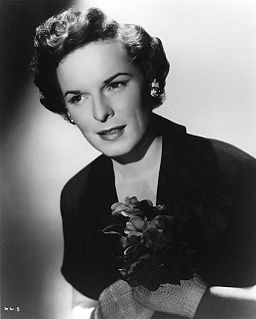 W
WFamily Skeleton is an American old-time radio serial drama, "the story of a girl with a dark past and highly uncertain future." It was broadcast on CBS from June 8, 1953, to March 5, 1954.
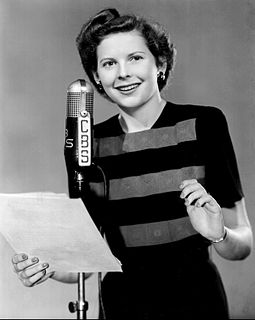 W
WFront Page Farrell is an American old-time radio program that was broadcast on Mutual from June 23, 1941 to March 13, 1942, and on NBC from September 14, 1942, to March 26, 1954. The episodes broadcast on Mutual originated at WOR, making the program the first live serial that Mutual broadcast from New York City.
 W
WThe Goldbergs is a comedy-drama broadcast from 1929 to 1946 on American radio, and from 1949 to 1956 on American television. It was adapted into a 1948 play, Me and Molly; a 1950 film The Goldbergs, and a 1973 Broadway musical, Molly. It also briefly spun off a comic strip from June 8, 1944 to December 21, 1945 with art by Irwin Hasen, a comic book artist who worked on various DC comics titles and would later do the Dondi comic strip.
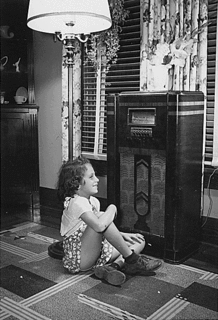 W
WThe Golden Age of Radio, also known as the old-time radio (OTR) era, was an era of radio in the United States where it was the dominant electronic home entertainment medium. It began with the birth of commercial radio broadcasting in the early 1920s and lasted through the 1950s, when television gradually superseded radio as the medium of choice for scripted programming, variety and dramatic shows.
 W
WHouse of Glass is an American old-time radio serial drama. It was broadcast on the Blue Network from April 17, 1935, until December 25, 1935, and revived on NBC from October 23, 1953, until March 12, 1954.
 W
WJohn's Other Wife is an American old-time radio soap opera. It was broadcast on NBC-Red from September 14, 1936, until March 1940. In that month it moved to NBC-Blue, where it ran until March 20, 1942.
 W
WJoyce Jordan, M.D. is a radio soap opera in the United States. It was broadcast on ABC, CBS and NBC at various times during the era of old-time radio.
 W
WKitty Keene, Inc. is an old-time radio soap running from 1937 to 1941 about a female private detective. It first aired on CBS and later on Mutual. Kitty was played by Beverley Younger, Gail Henshaw and Fran Carlon.
 W
WLife Can Be Beautiful was a daytime drama broadcast on NBC and CBS during its 16-year run. The program was also facetiously known to many as Elsie Beebe, a contrived acronym based on the show's initials.
 W
WLonely Women was a radio soap opera in the United States during World War II. It "told of women separated from their men by war." The 15-minute program, which was sponsored by General Mills, ran one season on NBC, with its first episode broadcast June 29, 1942."
 W
WLorenzo Jones was a daytime radio series which aired on NBC in different timeslots over an 18-year span.
 W
WMa Perkins is an American radio soap opera that was heard on NBC from 1933 to 1949 and on CBS from 1942 to 1960. Between 1942 and 1949, the show was heard simultaneously on both networks. During part of its run on NBC, that network's coverage was augmented by use of transcriptions. Beginning April 1, 1935, nine stations broadcast the transcriptions. Oxydol dropped its sponsorship in 1956. The program continued with various sponsors until 1960.
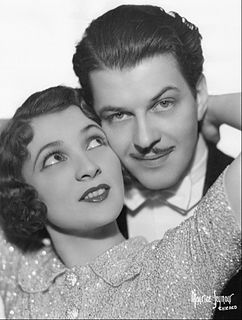 W
WMyrt and Marge is an American radio serial which aired from November 2, 1931 to March 27, 1942 on CBS Radio and the Mutual Broadcasting System. It was created and written by its main star, actress Myrtle Vail.
 W
WOne Man's Family is an American radio soap opera, heard for almost three decades, from 1932 to 1959. Created by Carlton E. Morse, it was the longest-running uninterrupted dramatic serial in the history of American radio. Television versions of the series aired in prime time from 1949 to 1952 and in daytime from 1954 to 1955.
 W
WOur Gal Sunday is an American soap opera produced by Frank and Anne Hummert, network broadcast via CBS from March 29, 1937, to January 2, 1959, starring Dorothy Lowell and, after Lowell's 1944 death, Vivian Smolen in the title role.
 W
WPainted Dreams is an American radio soap opera that premiered on WGN radio, Chicago, on October 20, 1930 and last aired in July 1943. It is widely considered by scholars of the genre to be the first daytime soap opera or drama-by-installment serial. The first to be broadcast in daytime over a radio network would be Clara, Lu 'n Em, two years later.
 W
WPortia Faces Life is an American soap opera first broadcast over radio from 1940 to 1953, and also on television for a single season in the mid-1950s. It began in syndication on April 1, 1940, and was broadcast on some stations that carried NBC programs, although it does not seem to have been an official part of that network's programming. The original title was Portia Blake Faces Life.
 W
WThe Romance of Helen Trent was a radio soap opera which aired on CBS from October 30, 1933 to June 24, 1960 for a total of 7,222 episodes. The show was created by Frank and Anne Hummert, who were among the most prolific producers during the radio soap era.
 W
WRosemary is an American radio soap opera broadcast on NBC Radio from October 2, 1944 to March 23, 1945, and on CBS Radio from March 26, 1945 to July 1, 1955. Starring Betty Winkler as Rosemary Dawson Roberts, the program's only sponsor was Procter & Gamble, primarily for Ivory Snow dishwashing liquid, Camay soap, Dash and Tide laundry detergents and Prell shampoo. The series was created by Elaine Carrington, who had previously created Pepper Young's Family (1932-1959) and When a Girl Marries (1939-1957).
 W
WStella Dallas was an America radio soap opera that ran from October 25, 1937, to December 23, 1955. The New York Times described the title character as "the beautiful daughter of an impoverished farmhand who had married above her station in life." She was played for the entire run of the series by Anne Elstner. Her husband Stephen Dallas was portrayed at various times by Leo McCabe, Arthur Hughes and Frederick Tazere. Initially, Joy Hathaway played Stella's daughter Laurel with Vivian Smolen later taking over the role. Laurel's husband was Dick Grosvenor.
 W
WValiant Lady is an American soap opera which ran daily on CBS radio and television from October 12, 1953, to August 16, 1957, at 12:00 PM (EST). The show's title was taken from a 1930s radio soap opera about a young woman struggling through life but is otherwise very different. Like many early soap operas, the show was broadcast live from CBS Studio 57 in Manhattan.
 W
WWendy Warren and the News was a radio soap opera in the United States. It was broadcast on CBS weekday afternoons, June 23, 1947 - November 12, 1958. The program was notable for the title character's reporting actual "women's news" in addition to appearing in a more traditional soap opera role.
 W
WWhen a Girl Marries is an American daytime radio drama that was broadcast on three major radio networks from 1939 to 1957. Created by Elaine Sterne Carrington, it was the highest rated soap opera during the mid-1940s.
 W
WYoung Doctor Malone is an American soap opera, created by Irna Phillips, which had a long run on radio and television from 1939 to 1963. The producer was Betty Corday (1912–1987), who also produced Pepper Young's Family and later was a co-creator with husband Ted Corday of NBC Daytime's Days of Our Lives.
 W
WYoung Widder Brown was a daytime radio drama series broadcast on NBC from 1938 to 1956. Sponsored by Sterling Drugs and Bayer Aspirin, it daily examined the life of "attractive Ellen Brown, with two fatherless children to support."
 W
WYour Family and Mine is an American radio drama series that aired April 25, 1938–April 28, 1939, on NBC, and May 1, 1939–April 26, 1940, on CBS. Sponsored by Sealtest, the 15-minute soap opera program aired weekdays at 5:15 p.m. ET on NBC, and at 2:30 p.m. ET on CBS.